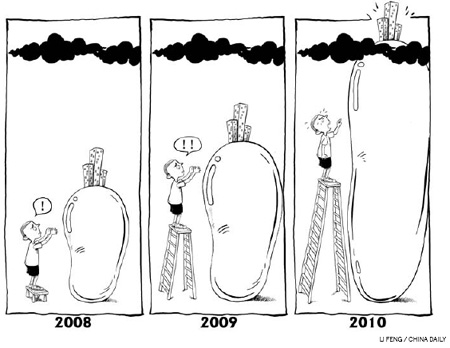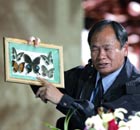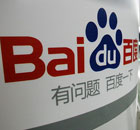Op-Ed Contributors
Golden time to make it right
By QIN Xiaoying (China Daily)
Updated: 2010-03-05 07:51
 |
Large Medium Small |

Annual sessions must seize opportunity to resolve theproblematic wealth distribution and outdated growth model
This year's two sessions of the National People's Congress (NPC) and the Chinese People's Political Consultative Conference (CPPCC) are once again a concentrated display of public opinion. It will also see domestic and foreign media swarming into Beijing to cover the annual event.
| ||||
To accurately understand the key issues to be raised at the annual two sessions, the public should first be well-informed about the basic opinions and judgments made by China's top decision-makers about the political, economic and social landscape, given that these judgments will likely decide the tone and directions of this year's sessions.
So how does China's leadership look upon its current political, economic and social situations? The answer is that the country's development is facing both "important strategic opportunities" and a "concentrated emergence" of various social contradictions, as indicated in past policy documents and public remarks by top leaders.
Amid the world economic recession, China has managed to overcome numerous economic difficulties and heighten its economic status. The important seat it has gained in the global economic scene and its ever-expanding voice in the ongoing readjustment of the global economic order has won the country an important strategic opportunity for further development.
But China's traditional development in industrialization and its pro-export growth model have also encountered unprecedented challenges.
A series of complicated issues that the country is facing, such as its real estate market, overproduction, growing inflation pressures and the dwindling momentum of exports, make it more necessary than ever for the Chinese government to push forward with changes to its long-established development model.
Fortunately, at their recent public outings, China's leaders frequently mentioned the word "change", indicating their determination to pursue new changes to the country's development. This means the country is more committed to a combination of consumption, investments and exports instead of relying excessively on the previous export- and investment-dependent model. It also symbolized the country's resolve in relying more on technological progress, quality in labor and improvement of management, instead of simply leaning on increased consumption of limited resources.
Chinese leaders have realized that the largest impact of the global financial crisis on China is not that the crisis has slowed its rapid economic growth, but that the crisis has sounded a wake-up call. It is high time China reversed and corrected its previous model of economic growth.
The "concentrated outbreak" of China's social contradictions is the direct outcome of its rapid development in recent decades. As early as 17 years ago, late leader Deng Xiaoping, the chief architect of China's reform and opening-up, once warned that "the country will not face fewer problems after it becomes more developed". As a legendary statesman who had ups and downs in his political career and held a strong sense of responsibility for his nation, Deng also pointed out that the main reason why China is facing more social problems lies in how the country is distributing its increasing social wealth.
In his collection of opinions about his government work report to be delivered to this year's NPC session, Premier Wen Jiabao admitted that corruption, the widening income gap and exceedingly high home prices are the top three issues fueling public dissatisfaction. All three factors are tied to the country's wealth distribution and to whether or not incomes can be spread evenly in a fair and reasonable manner. The Chinese government has come up with a string of workable policies and measures for the country's middle- and low-income groups, such as subsidizing farmers when they buy home appliances, and reducing an assortment of education fees for their children or exempting them altogether.
But a big and thorny problem for the Chinese government remains: How should it increase the incomes of its people, fundamentally change the low proportion of residents' incomes in the country's wealth, and boost domestic demand based on resident consumption. This issue will test the decision-making capability of our leaders, as well as their political wisdom and ethics.
Whether China can grasp the "strategic opportunity" that is emerging and survive recent social and economic problems, and whether it can position itself strategically in global affairs in the post-crisis era are expected to dominate the agendas of the ongoing NPC and CPPCC sessions, particularly during the country's transition from the 11th Five-Year Plan to the 12th.
The author is a researcher with China Foundation for International and Strategic Studies.
(China Daily 03/05/2010 page9)












